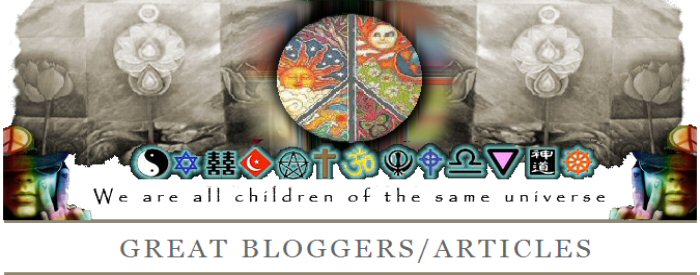
The Individual Path
By Steve Schlarb
Establishing Yourself as an Individual
While the ultimate result of any truly spiritual path is the negation of the individual ego-self, one cannot begin on one's own personal path of spiritual realization unless one establishes his/her individuality. That means freeing oneself from the demands of organized religions, creeds, socially accepted beliefs, the dictates of any prophet. All of these characteristics of religious participation establish only the group-identity, the body of like-minded believers. People can spend an entire lifetime following the teachings and beliefs of others, without ever finding the path that is right for them personally.
This is not to say that one should not participate in any organized religion. There is the benefit of sharing common beliefs, participating in worthwhile community activities, etc. But one should leave open for themselves their own private spiritual search for a deeper and more fulfilling connection to the Source of all religions -- which many call God. The outward expressions of group worship, ritual and prayer do not accelerate the personal relationship with the divine. Neither does one find that personal relationship with the divine when dealing through a priest or referring constantly to some approved text by a religion's prophet. Repeating an approved creed once a week does not bring one into the divine presence.
The focus of most group religions is on the external characterization of the divine. God is supposedly "out there," but to find your soul's connection to the divine, one must look within oneself. That means leaving (at least in one's private mind) the security of the "saved" group and its accepted creeds and rituals.
The truth is within ourselves. All the sages of the ancient past have found it so. Within ourselves are all the problems and promises that we must confront and meld into a whole Self that we can then project to the outward world. And within ourselves, in our unconscious mind, is the Spirit of God -- our spiritual essence that is constantly communicating with us -- if only we unlock the rigid pattern of thinking imposed by our conscious mind. The conscious mind deals in a mechanical way with the outward world, but the truth lies within. The group, the congregation, the society, cannot tell you which way to go. The group is interested more in security and conformity than it is in truth.
Into the Valley of the Shadow of Death
Only the individual can go on the personal search that is right for him or her. It means taking that mythological hero's trek away from the religious safety of the group, and wandering alone in uncharted spiritual territory. It means confronting alone the anxieties, potholes, feeling lost, and sometimes despair of the greatest quest of your life. This quest is for the "Holy Grail" of your soul -- confrontation and ultimate union with the divine Source of your soul.
When alone, the individual mental focus naturally turns inward. There is the usual learning phase in studying religions other than that in which one was raised, but true learning is not mere knowledge; it is absorption of the meaning of what one learns into one's self. In the internal search, one must confront the angels and demons of one's unconscious mind. We must accept the terrors of an unknown mental landscape, with only symbolic and quixotic guides to higher spiritual ground.
This search can be visualized as a traveler leaving the security of a mountain castle filled with the familiar forms of family, friends, and accepted society. The traveler wanders alone and uncertain, down the mountainside toward a dark unpopulated valley. The path is long, filled with the ethereal shapes of the unconscious mind: images, sometimes strange beings, sometimes human or part human, sometimes animal. There is the terror of separation from the familiar and safe, the sense of absolute aloneness with no idea of where the path will lead through this seemingly insane wilderness.
This is the Valley of the Shadow of Death in the well-known 23rd Psalm. Yet here, the spiritual searcher finds the clues and deeper understandings of his total mind. The conscious mind (in the cerebral cortex) can only deal with the already known, recognizable images, and build logical systems of thought from familiar patterns, but the unconscious mind of the seeker floods the conscious mind with strange images and shadows that challenge the logical systems built in one's earlier, immature stage. These images and feelings can appear beautiful, strange, threatening and disconcerting. They may be dreams of horror, death or resurrection while sleeping or anxiety over everyday situations while awake, and continue until the individual receives the personal revelation from the unconscious that is the vision meant for him. Then the totality of the unconscious is accepted and melded with the conscious, and stability returns.
The experience can be one of terror and despair, but that is only the necessary temporary phase, the death of the old self, the familiar, comfortable ego. Then the inner truth for that person is revealed. The new Self that emerges is no longer ego-bound, and no longer alone. As it says in the 23rd Psalm: Yea, though I walk through the Valley of the Shadow of Death, I will fear no evil, for Thou art with me.
The Discovery of One's Self
In the darkness of true spiritual aloneness, the ego dies. The soul, however, can never die. And it is the person's soul that comes through the dreaded Valley and begins the climb out on the side far removed from where one began this quest. This is the discovery of who the person really is, one's inner spirit or soul without superficial attachments to worldly identities -- the true Self. What happens in that Valley is specific and personal to each seeker. The dreams and visions that come to the mind -- once it is stripped of its complacency and familiar moorings -- are new and challenging. But they also beckon the searching soul toward its destination: that vision that is spiritually right for it. At one level, this is one's personal mythology, but with a solid core of truth. When one finds their own personal vision, there is no doubt, no vestige of longing, no anxiety. Within the embrace of this personal vision, the soul finds acceptance and love from the Source of itself.
This journey is one of choice, for while the unconscious stimuli come to all people, beckoning them toward their spiritual fulfillment, not all choose to take that lonely path. Most people choose to stay in the secure castle on their mountain high above the valley. They are safe within their group. They can always touch on some text, ritual, or prayer that gives them temporary solace, and they will always explain away those stimuli and ideas that threaten their castle of security.
But for the person who chooses to follow the calling of his own soul, the journey leads to a purity of vision and ultimately an immersion in the Divine. One's true Self no longer needs the human group or organization to tell it what it is or what it believes, for at this point, the Self no longer exists separate from its Source. It has come home.
Morning Star










